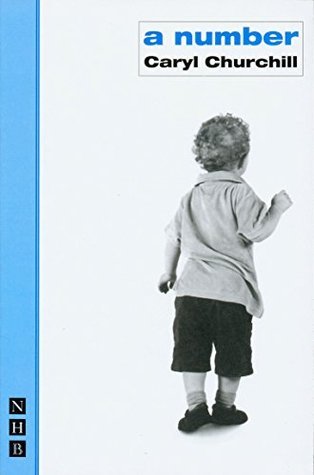What do you think?
Rate this book


A fascinating meditation on human cloning, personal identity and the conflicting claims of nature and nurture.
Winner of the Evening Standard Award for Best Play of 2002. A Number was first staged at the Royal Court Theatre, 2002, starring Michael Gambon & Daniel Craig.
'A Number confirms Churchill's status as the first dramatist of the 21st century... The questions this brilliant, harrowing play asks are almost unanswerable, which is why they must be asked' - Sunday Times
'Caryl Churchill's magnificent new play only lasts an hour but contains more drama, and more ideas, than most writers manage in a dozen full-length works. Part psychological thriller, part topical scientific speculation, and part analysis of the relationship between fathers and their sons, it combines elegant structural simplicity with an astonishing intellectual and emotional depth...What a tremendous play this is, moving thought-provoking and dramatically thrilling' - Daily Telegraph
'Rarely in my theatre-going experience has a new play conveyed such a disturbing or enthralling impression of domestic weirdness that some families may endure in a not entirely hypothetical future... It's an astonishing event' - Evening Standard
64 pages, Kindle Edition
First published January 1, 2002

Turner’s production is beautifully rounded – and spiky. Every aspect presses on Churchill’s themes. Arvo Pärt’s Fratres, an insistent set of variations, is woven between scenes.I was obviously going to follow that up with at least a reading of the play.

Characters
SALTER, a man in his early sixties
BERNARD, his son, forty
BERNARD, his son, thirty-five
MICHAEL BLACK, his son, thirty-five
The play is for two actors. One plays Salter, the other his sons.
The scene is the same throughout, it’s where Salter lives.
B2 - I’m just a copy. I’m not the real one.
Salter - You’re the only one.
B2 - What do you mean only, there’s all the others, there’s
Salter - but I didn’t know that, that wasn’t part of the deal. They were meant to make one of you not a whole number, they stole that, we’ll deal with, it’s something for lawyers. But you’re what I wanted, you’re the one
B2 - Did you give me the same name as him?
Salter - Does it make it worse?
B2 - Probably.
Salter No, we weren’t. But I managed. I was spending less.
B1 - You made an effort.
Salter - I did and for that money you’d think I’d get exclusive
B1 - they ripped you off
Salter - because one one was the deal and they
B1 - what do you expect?
Salter - from you too they it’s you they, just so they can do some scientific some research
Salter Nobody regrets more than me the completely unforeseen unforeseeable which isn’t my fault and does make it more upsetting but what I did did seem at the time the only and also it’s a tribute, I could have had a different one, a new child altogether that’s what most people but I wanted you again because I thought you were the best.
B1 - Because if he had I’d kill it.
Salter - No, he hasn’t got one.
B1 - So when you opened the door you didn’t recognize me.
Salter - No because
B1 - Do you recognize me now?
Salter - I know it’s you.
B1 - No but look at me.
Salter - I have. I am.
B1 - No, look in my eyes. No, keep looking. Look.
B2 - It’s partly that, it’s also it’s horrible, I don’t feel myself and there’s the others too, I don’t want to see them I don’t want them
Salter - I thought you did.
B2 - I thought I did, I might, if I go away by myself I might feel all right, I might feel – you can understand that.
Salter - Yes, yes I can.
B2 - Because there’s this person who’s identical to me
Salter - he’s not
B2 - who’s not identical, who’s like
Salter - not even very
B2 - not very like but very something terrible which is exactly the same genetic person
Salter - not the same person
B2 - and I don’t like it.
Salter - I know. I’m sorry.
Salter - … Can you tell me anything you remember? the day you left? can you tell me things I did I might have forgotten?
B1 - When I was following him there was a time I was getting on the same train and he looked round, I thought he was looking right at me but he didn’t see me. I got on the train and went with him all the way.
Salter - Yes? yes?
Michael - Have you seen the others?
Salter - You’re the first.
Michael - Are you going to meet us all?
Salter - I thought I’d start.
Michael - I’m sure everyone will be pleased to meet you. I know I am.
Michael - yes perhaps
Salter - because then you might be frightened
Michael - I don’t think
Salter - or angry
Michael - not really
Salter - because what does it do what does it to you to everything if there are all these walking around, what it does to me what am I and it’s not even me it happened to, so how you can just, you must think something about it.
Michael -I think it’s funny, I think it’s delightful
Salter - delightful
Michael - all these very similar people doing things like each other or a bit different or whatever we’re doing, what a thrill for the mad old professor if he’d lived to see it, I do see the joy of it. I know you’re not at all happy.